28 April 2008
The Red Sea
In the company of S/V Sandpiper, we entered The Gulf of Aden, sometimes referred to as "Pirates Alley". Soon we are approached by several small fishing boats powered with twin 75 HP Yamaha's. They come upon us in pairs even though we are ten to twenty miles offshore. 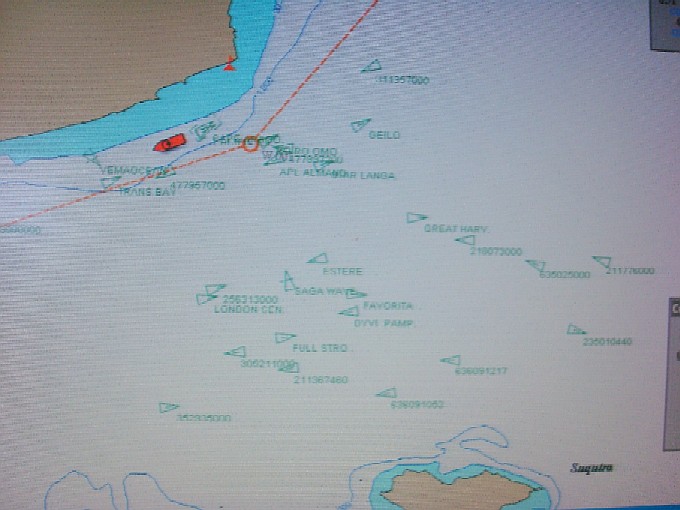
when they pull along side they make it clear with hand gestures that they want food and cigarettes. We tell them no. First we don't want to be approached by every fisherman as the word spreads, second we don't want to encourage this activity for boats passing after us and we don't want to have them lie along side and risk damaging or marring the freeboard. But in retrospect we are over reacting. As for larger boats the AIS allows us to see everyone that is equipped with a transponder and that should be any boat that is 300 tons or more. During our first full day on this leg we are approached by a vessel of major proportion that does not come up on the AIS. It is mid morning and Rene is on watch when the "coalition warship " hails us on channel 16. Now there's a good feeling. They assure us that they are available for our assistance should we need it. Well, okay. Now it suffices to say that these ships are not patrolling this area for the few plastic boats that are sailing the Arabian Sea but rather there is a great deal of US flagged shipping headed to the Persian Gulf carrying war supplies.
For the first three days we are on a close haul and inching our way toward land during the day. At dusk we tack out only to find wind shifts and finally no wind. Under these changing conditions we are learning how difficult it is to stay in close proximity to another boat. We are burning up more diesel than we had anticipated so we make our way to Al Mukalla for refueling and a night of rest.
Al Mukalla, Yemen
We arrive mid-morning and are visited by a small craft carrying the agent, someone from immigration, four other gentlemen and two goats. Only two people board Shiraz. Our passports are traded in for shore passes and we schedule for fuel to be delivered the next morning.
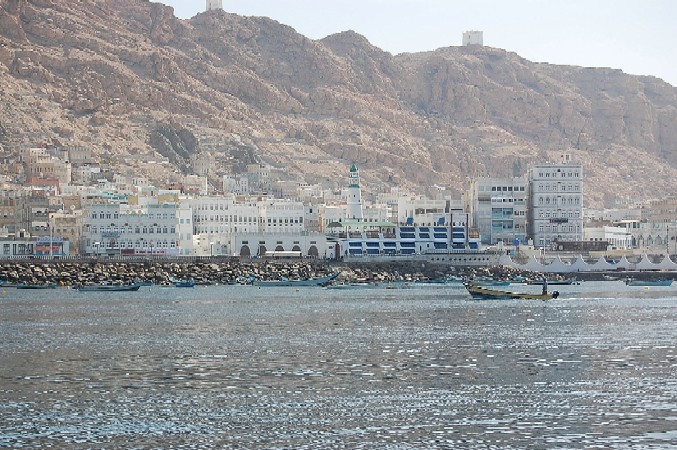
The city has a stark skyline and the city appears to be pushed to shore by the high cliffs in the backdrop. At night the sodium lights give an eerie glow against the mountains and the city takes on a a foreboding look.
On shore the first day we get a stark comparison of Oman's per capita income of $7600 and the $670 in Yemen. Women for the most part are absent and those that are present are covered in black veils and gloves with only their eyes peeking out from the blackness. (I like to think they are all beautiful under all that blackness that covers them but I could be wrong). Although there are ATM's and an "enter net", poverty prevails. Dispossessed women are begging in the street and men are sleeping on park benches and the state of the city is down trodden. Dust is a constant companion and it blows out to the anchorage and covers the boat. But everyone is friendly and we refuel and head out the next day after spending two nights due to the late hour of the fuel delivery.
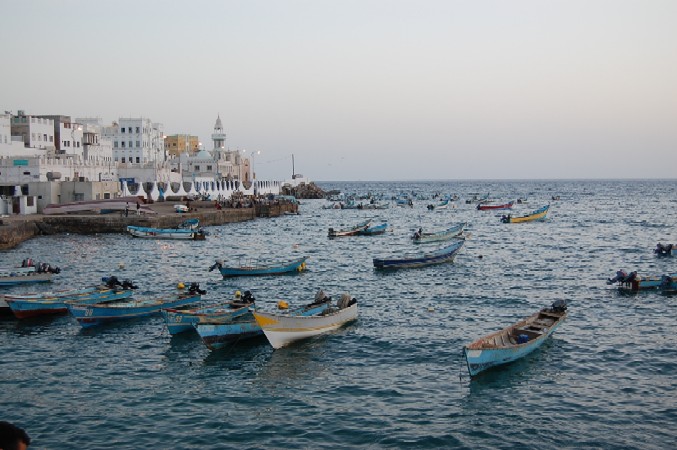
Now with plenty of fuel the wind picks up and it is blowing 20 to 25 downwind and we are racing to Aden. During my first night shift a vessel appears on the port stern and hails us on 16. It's another "coalition warship" and they have a dozen questions as to our opinion about their presence and what our major concerns are. They asked if we were aware of any pirating actions (no, are you ) and suggested that we stay at least 100 nautical miles away from Somalia. They also want to know how we get information while on board and ashore. The ship is a 100 foot US Coast Guard vessel and we know this because later that evening the vessel hails Sandpiper. Tom, having spent 20 years in the US Coast Guard, recognizes the chatter and although they cannot reveal their identity they talk for a while.
Aden, Yemen
We make Aden Harbor late in the afternoon and anchor in the yacht area where there are several boats already and a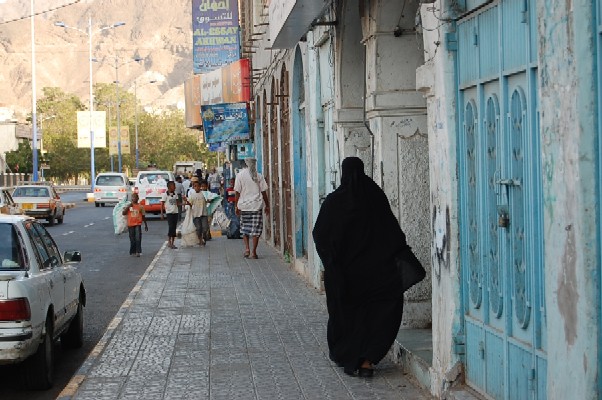
very noisy night club nearby (the Sailors Bar and Motel, use your imagination). The harbor is a major industrial port with bulk loaders and container ships making their way in and out day and night. Formalities are easy and there are several taxi drivers to help with anything we need including a trip to the Aden Mall and it is as beautiful as any in the US. Internet, Pizza Hut, LuLu's supermarket are our targets and the rest of the mall is filled with luxury items especially jewelery, perfume and very colorful and revealing women's wear. Although all the women in Aden are covered in black when out in public some have colorful scarfs covering their hair and you can see their face. But after they get home they like to dress up.
Although we are still in Yemen this part of Aden is different than Al Mukalla.
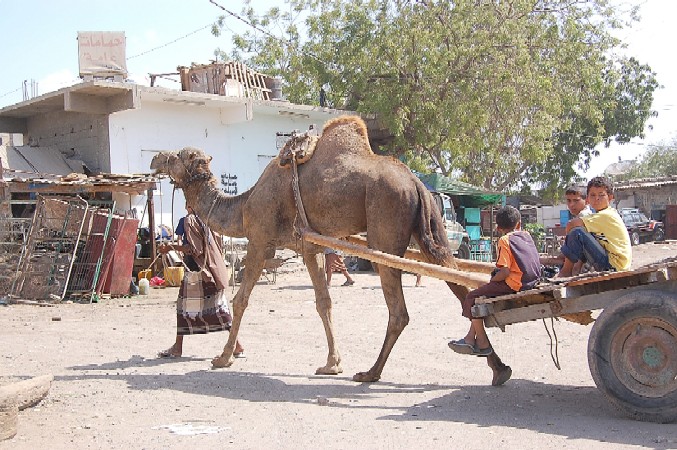
Aden was the capital of what was once South Yemen and it is a historic location. We take a tour of the area which consist mostly of a tour of the local market which is a dramatic contrast from the mall. Our guide is well schooled with perfect English and we talk about all type of things religious, cultural and historic. This half day cost us $30. Camels are still used as transport especially when the streets or roads are too narrow or too rough for trucks. One of the benefits of being in a developing nations is the ability of the locals to repair things. Sandpiper had an alternator repaired and a pump rebuilt.
We are finding that the locals are very proud of their country. Despite the poverty and the dilapidation of most areas the people are friendly. When asked the guide to tell what he knew of the attack on the USS Cole in 1994 but it is an event Yemen would rather forget and he has little to say.
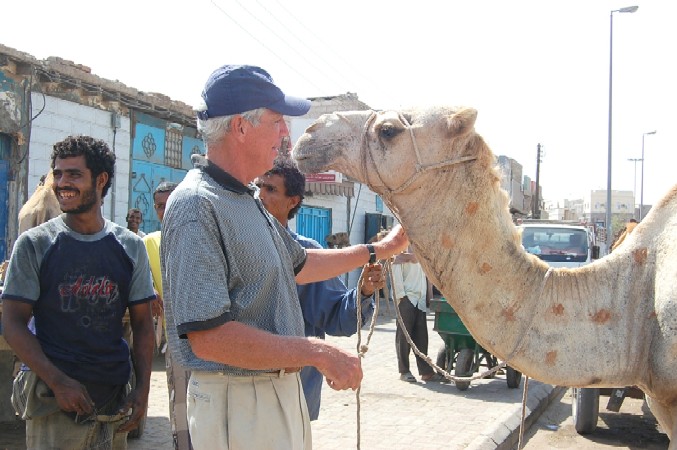
We depart Aden in the company of a third boat, My Chance, a Turkish flagged vessel with Alim and his wife Kian on board. Alim writes a monthly article for the largest sailing magazine in Turkey and when they arrive home they will have completed their five year circumnavigation. The winds are favorable as we make our way to the Straights of Bab el Mandeb also called the "straights of sorrow". We have planned our departure so as to arrive at daylight and as we draw closer to these narrows the wind increases to thirty knots and finally we are pounding across the shipping channel. We turn down wind under jib alone to make our way to the first anchorage, Marsa (Arabic for anchorage) Dudo.
Eritrea
Next we sail to Port Smyth (Shumma Island) a small island off the cost of Eritrea and spend two nights because of the winds and the fact that the spear fishing and snorkeling are good. For two nights we enjoy the grouper and each others company. It is only a day sail to Massawa and we arrive making 7.5 to 8 knots. Of the two port of entry, Assab and Massawa, most cruisers chose the later. After checking in we find Mike at the Yasmin Bar. Mike is the local who arranges for your laundry, taxi and other needs but there is no diesel available. Today we he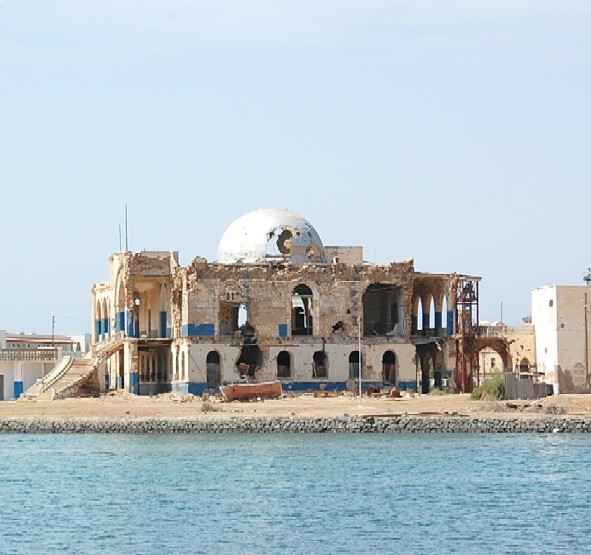 ard that the UN boarder security force will abandon their mission in Eritrea due to the lack of diesel so we may be involved in more than a credit crunch. There have been a few reported thefts in Massawa and Mike was very upset and apologetic. You can hire a boat guard for very little if you are traveling inland. ard that the UN boarder security force will abandon their mission in Eritrea due to the lack of diesel so we may be involved in more than a credit crunch. There have been a few reported thefts in Massawa and Mike was very upset and apologetic. You can hire a boat guard for very little if you are traveling inland.
In the early 1950s the UN supported the union of Ethiopia and Eritrea. This cross cultural combination resulted in a fight for Eritrean independence that lasted from 1960 and culminated in a surge in 1991. During the bombings of Massawa the palace of Haile Selassie was destroyed. You know Haile the "Lion" referred to in the songs by Bob Marley and other Rastafarian. You can see his "lair" in the photo to your right. Of course in 1991 Haile was long dead so it was more a symbolic gesture. Nearby is the bombed out remains of the Bank of Italy. Italy controlled this part of Africa from early colonial days until 1941 when the British drove them out, but the Italian imprint remains.
In 1993 a referendum for independence was recognized by the UN and today this country of patriotic citizens relies heavily on the UN for a great amount of support.
We have arranged for a car to take us to Asmara, the capital where we will spend the night. My Chance decided not to go so they are keeping an eye on our boat. Up the steep highway to Asmara, we find rocks, terraced mountains, sun baked desert, camels and a troop of panhandling Red Ass Baboons.
The per capita income of 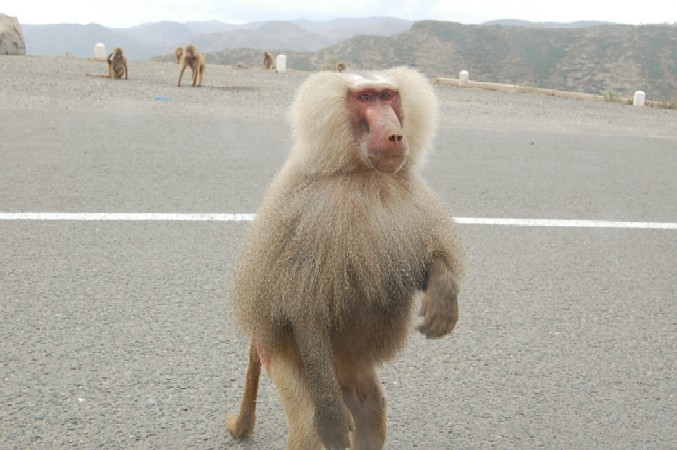 Eritrea is about $170 compared to the US of about $35,000. Arriving in Asmara we find a level or two above the average poverty but still you can see that life is not what is use to be. The main street has many pastissrie where gorgeous looking treats line the shelves. At the sidewalk coffee shops you find older men sitting and reading the newspaper with only one cup of tea in front of a half a dozen or so. People are friendly and the Italians have left a "sense of style" in the capital where people dress fashionably with what they can afford. As we eat chocolate covered donuts we discuss the economy in Eritrea and wonder what we can do about the poverty. We have read the books, Mountains Beyond Mountains about Dr Paul Farmer and Three Cups of Tea about Greg Mortenson but we realize we are not made of the same stuff as these extraordinary people. So we finally decide that the money we spend is stimulating the economy and encouraging capitalism. We order another donut in self-disgust. Eritrea is about $170 compared to the US of about $35,000. Arriving in Asmara we find a level or two above the average poverty but still you can see that life is not what is use to be. The main street has many pastissrie where gorgeous looking treats line the shelves. At the sidewalk coffee shops you find older men sitting and reading the newspaper with only one cup of tea in front of a half a dozen or so. People are friendly and the Italians have left a "sense of style" in the capital where people dress fashionably with what they can afford. As we eat chocolate covered donuts we discuss the economy in Eritrea and wonder what we can do about the poverty. We have read the books, Mountains Beyond Mountains about Dr Paul Farmer and Three Cups of Tea about Greg Mortenson but we realize we are not made of the same stuff as these extraordinary people. So we finally decide that the money we spend is stimulating the economy and encouraging capitalism. We order another donut in self-disgust.
Sandpiper needed to expand the pages in their passports so we head for the US Embassy only to find that they work only four days a week and have both US and Eritrean holidays off. Not bad hours. The temperature is cool and it rains the evening we are there. The $25 per night hotel has CNN so we catch up with some sound bits.
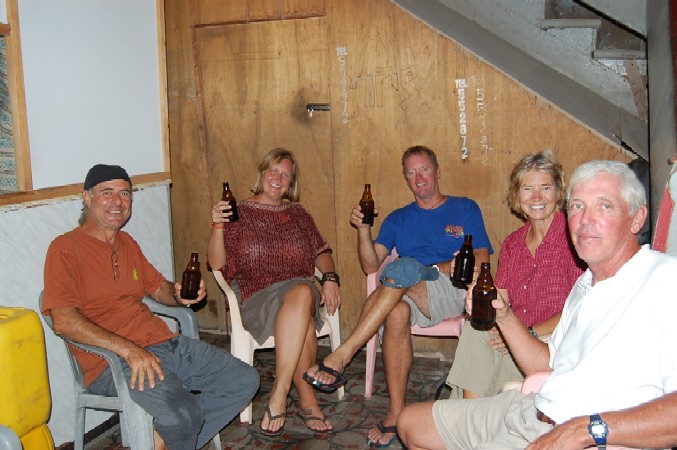
Upon our return to Massawa, we are able to find a few remaining beers from the local brewery which is now closed due to the lack of hops and grain. We drink to celebrate
Rene's birthday but we are asked to consume our beers in a private room so that there will not be a rush on this precious commodity. Now we are really the "ugly American" but whom else are they going to sell them to?
To clear Massawa we must take our boat to the ship dock but it is a non-event since the tide is up and there are no winds. We are off for Sudan.
Every line on the boat is salt encrusted and as stiff as a tree branch, the vessel is covered with dust, the heat of the morning makes you wonder if you can accomplish anything today, the refrigerator is running for hours, and oh yea my urine is an ochre color, thought you would want to know. By some measure, Massawa is ranked the worlds hottest place and although we are headed north it is not fast enough to outrun the summer solstice. Winds are variable and the only weather information we have is from the "grib files" but mostly the winds (there is no weather) are very local and we take what we can get. We sometimes listen in on the "Turkey Net" for the weather that is 100 miles north of us since the same winds may be on us in about 24 hours. Did I tell you it was hot?
The Sudan
Most legs of this journey is a close haul and the seas are 3 to 4 but at a short interval, meaning that it is a rough ride. At night the winds die down so our small flotilla of three stops at one of the many anchorages. Where ever we pull in we find a local fishing boat or two and the fishermen greet us with a friendly wave and then ignored us. Some do approach for cigarettes and so far all have been smiling and very polite. Fish are very plentiful and you can catch a good sized tuna, spanish mackerel or barracuda in no time. If you came from the Caribbean you probably abstain from eating barracuda although these open water variety are eaten by many.
Suakin
Finally we arrive in the country where Africans and Arabs meet. The Sudan is a land of a hundred languages and dialects and as difficult to govern as probably any place in the world. We enter the port at Suakin since it is less expensive and you can cruise right past the 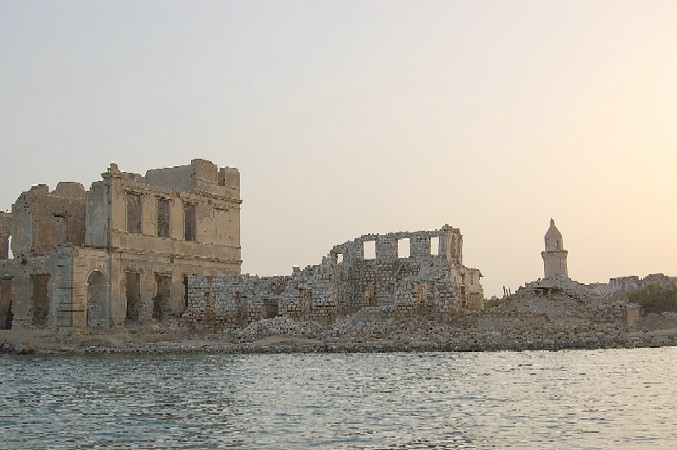
buildings of Old Suakin. Since the 10th century Suakin was an important trading center and in fact the last slave-trading post in the world, used as such until the end of the Second World War.
Abu Mohammed is our agent and he arrives at the boat just as we anchor near the ruins of the old city. We pay our fees, arrange for diesel, and get our shore pass all in quick order.
The next day we catch the bus to Port Sudan for a day visit. The stark landscape is dotted with tents and small herds of camels and goats. Port Sudan is a major city but the largest supermarket is only about 1200 square feet. However the outdoor market is very large and full of vegetables and fruits and meat if you like goat. The produce is as good as we have seen for a long time but it certainly isn't grown nearby but the Nile runs through Sudan and we speculate that this area provides the produce. It is a good day and the people are very friendly and anxious to practice their English but many adults object to having their picture taken. Also taking pictures near police stations or military installations is forbidden since these are considered sensitive areas. Friends of ours were detained.
Heading North
Departing Suakin we head north a step at a time and find many interesting anchorages. Those near shore don't have the water clarity of the islands and reefs off shore where we are starting to find a number of live aboard dive boats. We depart Khor Shinab for a two night one day sail to Fury Shoals and a location called Dolphin Reef. On the last night we are taking a pounding with winds of 20 knots plus right on the nose. Our companions boats have found shelter near shore but we are further north and decide to continue on to the protection of the reef. While approaching the reef hundreds of dolphin of several different species swim along side and since the waves are high they hurl themselves about six feet out of the water, we think to announce our arrival. There are four other yachts at the reef and that night six dive boats anchor down. The reef complex is so large that it could hold several dozen more boats. The winds are forecasted to be from the north for the next three or four days so we settle in for a long stay. Our friends are anchored 16 miles to the south and the next day My Chance makes a break for the Reef. Eleven hours later, just before sunset, they pull in. Think about that; 16 nautical miles in 11 hours. They have forgotten how many times they have tacted and in the end they have all three sails up and are motoring, making 2.8 knots.
On day four, we venture out to snorkle and although the water is beautiful and there is an abundance of fish we can only snorkel in water where you can stand up. If you lose you grip chances are you will be swept away unless you can quickly put your feet on the bottom to hold your own against the current. We quickly give up on water activities. So it's back to reading and DVD's.
We are visited by a powerful Zodiac from one of the dive boats and they tell us that every morning at 10 dolphins are swimming in the eastern bay of the reef and that we should dinghy over to swim with them. The next morning the winds are 30 knots so we postpone the excursion to a more favorable time to move the boat.
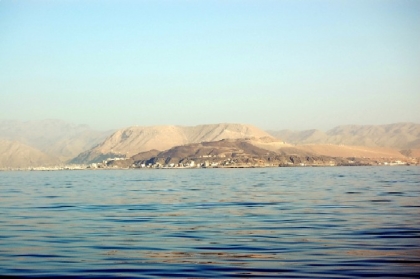
| |
  
|
Entering Al Mukalla Yemen
|
If you're headed our way:
- After more experience with the AIS and learning how to prioritize information, we now find it a valuable tool that we would recommend to all. But it is not without flaws. One vessel was pointing one way and traveling the other. One of the major advantages is that it usually shows the vessels name so if you have to hail that vessel you call it by name.
- US dollars are necessary in this part of the Red Sea. There are no ATM's in Eritrea or The Sudan and you can't wait for a bank to honor a withdrawal on you debit or credit card.
- Don't count on doing much on the internet in Eritrea. Way too slow.
- To receive a shore pass you must turn in your passport and live within the restrictions of a crew hand upon a visiting freighter. Sometimes this means you cannot go into town after 1730 hours. But more often than not it is a savings since you don't need a visa.
Back Next
|